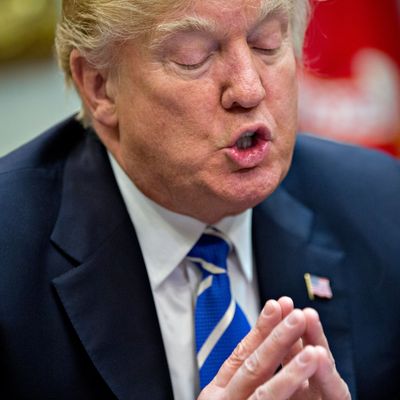
The Trump administration’s announcement that it will support a gigantic tax cut, rather than “tax reform,” is exactly the outcome that’s been inevitable from the beginning. Given that the Republican effort to dismantle Obamacare imploded, it is tempting to assume that a similar fate awaits the Trump tax cuts. But this misunderstands the modern Republican Party, which remains fanatically devoted to the cause of regressive tax cuts, and which is very likely to pass Trump’s plan, or something like it.
The confusion over the plan’s prospects arises from the fact that Republicans have been internally debating the merits of tax reform versus tax cuts, giving the impression of a schism. “Republicans in Congress still have no agreement for a vision on taxes, and the White House doesn’t have a plan of its own,” writes Josh Barro. “Tax reform dies for all sorts of good reasons, and this administration looks even less organized on the issue than those that have failed to reform the tax code in the past. My bet on a Trump tax legacy: nothing.”
The truth is that Republicans have little interest in truly reforming the tax code. (We know this because, in 2014, Republican Ways and Means chairman Dave Camp suddenly and unexpectedly wandered off the party reservation to propose a genuine tax-reform plan before his retirement, only to be shunned for his heresy by the entire party.) The interest in “reform” grew from a desire by Republicans to pass permanent tax cuts for the rich. The logic is that a tax cut for the rich won’t attract any Democratic votes, which means it would have to pass through a “reconciliation” bill. Senate rules prohibit using reconciliation for any bill that adds to the deficit after a decade. Republicans hoped to offset the cost of their tax cuts for the rich with tax increases on the non-rich, allowing the cuts to be permanent. Paul Ryan was especially keen on a border-adjustment tax, which would, in theory, raise a trillion dollars in revenue from the poor and middle class that could offset the cost of tax cuts for rich people. But that idea provoked deep opposition from retailers, and senators in states (such as Walmart’s Arkansas) where they have pull. With that source of funding politically dead, Republicans have no way to pay for their tax cuts.
So … they won’t. But that doesn’t mean proponents of “tax reform” will walk away. It just means they’ll have to settle for the same thing they enthusiastically passed in 2001: a debt-financed tax cut that is phased out after a decade. Trumpcare died because a large faction of vulnerable Republicans opposed its essential function of taking health care away from their constituents. Nobody in the party opposes the basic function of cutting taxes for rich people. Some of them want to use their control of government to pass a tax cut that’s more likely to last, but from their perspective, ten years of lower taxes for rich people is going to be way better than none.






























